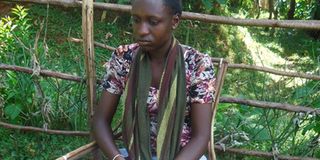The story of Vihiga's unwanted children

Dinah Mboga during the interview. PHOTO | DERICK LUVEGA |
What you need to know:
- Children born of incest are shunned by their families and the community.
- Local officials aim to give such children an chance at a normal life.
Numerous cases of incest in Vihiga remain a cause of concern, with children born of incest being killed or thrown away to "cleanse" the affected family.
In such circumstances, the mother is not allowed to care for the "evil" baby.
Vihiga Sub County children's officer Michael Nanjira says his office, at the county headquarters in Mbale, continues to receive a minimum of ten such cases monthly.
"These are reported cases. No one knows how many go unreported and how many children are killed for a mistake they did not commit," he says.
Mr Nanjira explains that the children's office and social workers had partnered in educating residents about incest and encouraging people not to kill the children.
"In this part of the country, it is a taboo to nurture such babies but the reported figures are becoming increasingly high. This should concern the society," Mr Nanjira says.
He, however, notes that Vihiga County does not have a children's home for infants, which hinders the fight against stigma against babies born of incest.
Most of the infants are therefore taken to Bukura Children's Home in Kakamega County.
MAY BE LENIENT
According to sections 20 and 21 of the Sexual Offenses Act, the offense of incest can be committed by both male and female persons involved.
The provisions of the Act prohibit sexual relations between people who are closely related by birth.
The penalty for incest and or attempted incest is a minimum of 10 years imprisonment or life imprisonment in case where one of the involved parties is a minor.
The law, in the case of adults, may however be lenient on the parties if it is proved that they had no knowledge of a blood relationship between them prior to the sexual relationship.
A visit by Nation.co.ke to Vumale village, Central Maragoli location in Vihiga County led us to 21-year-old Dinah Mboga, a victim of incest.
She gave birth to a baby boy from a relationship that was later condemned as her boyfriend was said to be her cousin.
She says she is coming out publicly in order to educate society about incest, which is considered a taboo by her Maragoli sub-tribe and the larger Luhya community.
"I met him immediately after completing my secondary education," she recalls, adding: "We quickly became friends then lovers and before we knew it, I was pregnant in a month."
She says upon discovering her pregnancy, her parents investigated the lineage of the man responsible, only to discover it was her cousin from a village at Mukingi in Vihiga Sub County.
"I had neither seen nor met him while growing up. He did not tell me the truth when I asked him if we are related. I don't know why he could not tell me the truth," regrets Ms Mboga.
She adds, "We thought of (carrying out an) abortion but because we are a Christian family, we opted to let the child live."
SOUGHT ADVICE
She says the relationship was discontinued after the two families expressed their concerns.
Early preparations of "disposing of" the infant upon birth began to avoid going against the tradition that demands such children should not be nursed.
"My mother and I visited the Mbale children's office for advice because we did not want to harm the infant," Ms Mboga recalled.
The baby was born on September 14 last year and is now in a children's home.
"I named the baby but I did not use any family name, because it was not part of family. The children's office took the baby and I reluctantly left the hospital but I could not do anything because if I took it home, the baby and I could be thrown away," she says.
Ms Mboga says she is pained that tradition did not allow her to even breastfeed the child, the baby was "unwanted", not just at home but the entire village and community.
"I want to tell the society not to kill innocent babies. They commit no sin. Involve the children's office and let such children live," she says.
She further asks young girls to first get all the details of those they fall in love with before "taking their relationship to the next level".
YOUNG MOTHERS SUFFERING
Mr Nanjira agrees that situations such as that of Ms Mboga have left young mothers in pain with many suffering secretly.
He says he was aware of Mboga's case because it was reported to his office.
Once such a case has been reported, he says, the office asks for a letter from the local administration to ascertain that the pregnancy is as a result of a relationship between two blood relatives.
This, he adds, is because the local administrators (chiefs and their assistants) have the local knowledge to determine the nature of the relationship
The children's and social office then jointly ask the expectant mother to write two consent letters giving permission to the two offices to take the child away from the mother once it is born.
A second consent letter is written after six months
The two offices follow up to ensure that the infant is being taken care of well at the children's home.
Once the child has grown, the home can legally undertake the adoption process.



